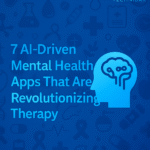Mental health is a core topic in the lives of human beings which affect thinking, feeling, and behavior. It influences the way people cope with stress, interact with other people, and make decisions. Much as physical health is vital at any age, mental health is also critical right at childhood and adolescent stages, as well as adulthood. Nonetheless, the issue of mental health is often misinterpreted, neglected, or prejudiced in most communities.
Define Mental Health
Mental health defines how well you feel, think, and act and all these are your emotional, psychological, and social well-being. It helps one to handle the stresses of life, access your full potential, learn, work effectively and make contributions in your community. It is not merely the exclusion of mental illness but is an essential component to overall health and quality life and it affects everything including relationships and decision-making
Causes of Mental Health
Mental health problems are the result of multiple factors of biological, psychological and social nature working together, rather than one. Major contributors are genetics, brain chemistry, trauma, constant stress and stress, adverse childhood events, significant life changes, social isolation and substance misuse.
Biological Factors
Genetics:
A genetic predisposition can also predispose a person because of the presence of certain genes or gene variants through the family history of mental health conditions.
Brain Chemistry:
Distorted brain chemicals, or neurotransmitters can affect mood and thinkingDistorted brain chemicals, or neurotransmitters can affect mood and thinking
Psychological Factors
Trauma and Abuse:
Personal experiences like childhood abuse and neglect, combat in the military, or exposure to violence can greatly increase the chances of the development of mental health problems.
Stress:
Through work, financial, and relations, among other aspects, long-term stresses have great impacts on mental well-being.
Personality Traits:
Some personality characteristics such as perfectionism, or low self-esteem may predispose an individual to mental health issues.
Social and Environmental conditions
Social Isolation:
The lack of strong connections with others and loneliness is a serious risk factor.
Stigmatization and Stigmatization:
Being a victim of racism or otherwise facing discrimination may affect mental health in a negative way.
Substance Misuse:
Under the influence of alcohol or recreational drugs, brain chemistry changes and may provoke mental health conditions or lead to their aggravation.
Life Changes:
Life experiences like death of loved ones, divorce, or loss of job, may be great stressors.
Types of Mental Health
Anxiety disorders:
Anxiety disorders are the group of mental disorders that comprises:
- generalised anxiety disorderS
- social phobias
- Specific phobias (eg, agoraphobia and claustrophobia)
Panic disorders:
- obsession compulsive disorder (OCD)
- Sharing the outcome that can also be diagnosed as post-traumatic stress disorder (PTSD).
- Without treatment, anxiety disorder may cause severe impairment in the lives of people.
Behavioural and emotional disorders in children
Some commonly occurring behaviour problems in children include:
- discipline problems and oppositional defiant disorder (ODD)
- antisocial behavior defined by conduct disorder (CD)
- attention deficit hyperactivity disorder (AD/HD).
Treatment may be counseling, education, and/or medication for these mental health conditions.
Bipolar affective disorder
Bipolar affective disorder is a syndrome, a mood disorder, also called manic depression. A bipolar disorder is a condition that affects an individual causing him or her to experience mania (elation) and depression. The individual can or may not show any symptoms of psychosis The cause is not exactly known, though a genetic predisposition has been well established. The episodes of this mental illness can also be caused by environmental stressors
Eating disorders
Eating disorders comprise anorexia, bulimia nervosa and other binge eating disorders. Eating disorders do not spare any age group or gender, and may have grave psychological and physical impacts.
Diagnosis of Mental Health
A mental health diagnosis entails a physical examination, medical history, and a psychological assessment by a mental health professional in order to know what is going on in the mind. This can involve using standardised questionnaires or cognitive tests and perhaps involving multiple scheduled visits and achieving a diagnosis with the criteria used in a guide such as the DSM-5. The goal is to give you an outline of the treatment, and enhance your quality of life.
Diagnostic Steps in the Process
1. Medical History & Physical Visit
You will talk with a doctor and he will do a physical examination, sometimes with laboratory testing, to eliminate other medical conditions that can lead to your symptoms.
2. Psychological Evaluation:
A mental health professional will inquire questions regarding what you think, how you feel, what you do, and how it interprets your life.
3. Cognitive Assessment:
You might be relegated to tests to assess your retention capabilities, concentration skills, problem solving capacity and mental reasoning
Typical Treatments
Psychotherapy( Talk Therapy):
This includes the process of conversation with mental health professionals to learn how to deal with thoughts and behaviors. It may be done by yourself or with the family or a group of people.
Medication:
Antidepressants, antipsychotics, and mood stabilizers are psychiatric medications that can help correct the balance of brain chemicals to alleviate the symptoms.
Supportive Services:
Lifetime education programs, care coordination, and social support through programs can aid individuals in the management of their condition
Conclusion
Mental health is no luxury, but a requirement of a healthy, productive and fulfilling life. With the evolving burdens that come with the modern lifestyle- be they stress of the job, personal strife, or world events; it has become crucial now more than ever to take care of mental health. Increasing sensitivity, enabling discussions to occur, and offering convenient assistance would help to create the world where no one would feel left out of the mental, emotional, and social well-being.








